Letter To Give Permission For Medical Treatment
[Your Name]
[Your Address]
[City, State, Zip Code]
[Email Address]
[Phone Number]
[Today's Date]
[Recipient's Name]
[Medical Facility/Hospital Name]
[Address]
[City, State, Zip Code]
Subject: Permission for Medical Treatment for [Patient's Full Name] - Date of Birth: [DOB]
Dear [Recipient's Name],
I am writing this letter to grant permission for medical treatment for my [relationship to patient], [Patient's Full Name], who was born on [Date of Birth]. Due to unforeseen circumstances, I am unable to be physically present to provide consent in person. Therefore, I am entrusting the medical decisions and care of [Patient's Full Name] to the capable and professional hands of your esteemed medical facility.
I hereby authorize the medical staff at [Medical Facility/Hospital Name] to administer any necessary medical treatments, conduct diagnostic tests, and perform any surgical procedures deemed necessary for the well-being and recovery of [Patient's Full Name]. This authorization includes any emergency medical procedures that may arise during the course of treatment.
Furthermore, I authorize the disclosure of medical information regarding the condition and treatment of [Patient's Full Name] to me, as well as to any other family members or individuals who may be involved in their care and support.
Please be assured that I have complete trust in the medical expertise and judgment of your team and that I believe you will act in the best interest of the patient at all times.
If any further information or documentation is required, please do not hesitate to contact me at [Your Phone Number] or [Your Email Address].
Thank you for your attention to this matter and for providing the necessary medical care for [Patient's Full Name]. Your dedication and commitment to your patients are deeply appreciated.
Sincerely,
[Your Full Name]
[Your Signature if sending a physical letter]
Permission for Child's Medical Treatment (Parent/Guardian)
Subject: Medical Treatment Authorization for [Child's Full Name]
Dear Healthcare Provider,
I, [Parent/Guardian Full Name], as the legal parent/guardian of [Child's Full Name], born on [Date of Birth], hereby grant permission for you to provide necessary medical treatment to my child.
This authorization includes routine medical care, emergency treatment, diagnostic procedures, medications, and any other medical interventions deemed necessary by the attending physician. I understand that while I will be contacted whenever possible, this consent allows treatment to proceed in emergency situations where immediate contact may not be feasible.
My child has the following medical conditions/allergies: [List any known conditions, allergies, or medications]
I can be reached at [Phone Number] or [Email Address]. In case I cannot be reached, please contact [Emergency Contact Name] at [Emergency Contact Phone].
I acknowledge that no medical procedure is 100% successful, and I understand the risks involved in medical treatment. I hereby release the medical facility and its staff from any liability arising from the treatment provided under this authorization.
This permission remains valid until [End Date] unless revoked by me in writing.
Sincerely,
[Parent/Guardian Signature]
[Printed Name]
[Date]
Medical Treatment Permission for Spouse/Partner
Subject: Medical Decision Authority for My Beloved [Spouse/Partner Name]
My Dearest Medical Team,
As the devoted spouse/partner of [Patient Full Name], I am writing to formally authorize medical treatment on their behalf during times when they cannot speak for themselves.
Our relationship spans [Duration], and I know [his/her/their] medical wishes better than anyone. [He/She/They] would want me to ensure [he/she/they] receive the best possible care, and I trust your professional judgment completely.
[Patient Name] has expressed the following medical preferences to me: [List any known preferences, living will details, or specific instructions]
Please know that [he/she/they] suffer from [any chronic conditions] and is allergic to [list allergies]. Current medications include [list medications].
I understand the gravity of medical decisions and accept full responsibility for choices made in [his/her/their] best interest. Please keep me informed of all developments and treatment options.
You can reach me 24/7 at [Phone] or [Email]. My alternate contact is [Name] at [Phone].
With deep trust in your expertise,
[Your Signature]
[Your Printed Name]
[Relationship to Patient]
[Date]
Travel Medical Authorization for Minor
Subject: Travel Medical Authorization for [Child's Name] - [Trip Dates]
Dear Medical Professionals,
I, [Parent Name], parent/legal guardian of [Child's Full Name] (DOB: [Date]), hereby authorize [Supervising Adult Name] and any licensed medical professionals to make medical decisions for my child during their travel from [Start Date] to [End Date].
This trip involves travel to [Destination] for [Purpose - school trip, camp, sports, etc.]. The supervising adult has my complete trust and authority to consent to any necessary medical treatment including emergency care, routine care, prescription medications, and diagnostic procedures.
CRITICAL MEDICAL INFORMATION:
- Known allergies: [List all allergies]
- Current medications: [List with dosages]
- Medical conditions: [List any conditions]
- Insurance Information: [Policy number and carrier]
EMERGENCY CONTACTS:
Primary: [Parent name and 24/7 phone]
Secondary: [Another contact and phone]
Family Doctor: [Name and phone]
The supervising adult, [Name], can be reached at [Phone] and has copies of insurance cards and emergency contact information.
I understand that medical emergencies may require immediate treatment, and I fully authorize such care in my absence.
Respectfully,
[Parent Signature]
[Printed Name]
[Date]
[Notarization if required]
Elderly Parent Medical Care Authorization
Subject: Medical Care Authorization for My Parent, [Parent's Full Name]
Dear Healthcare Team,
With a heavy but determined heart, I am writing to authorize medical treatment for my beloved parent, [Parent's Full Name], born [Date of Birth]. Due to [condition - dementia, cognitive decline, etc.], [he/she/they] can no longer make informed medical decisions.
As [his/her/their] [son/daughter/child] and designated healthcare proxy, I am legally authorized to make medical decisions on [his/her/their] behalf. I have [power of attorney/healthcare directive] documentation attached.
My parent has always been [brief personal touch about their character]. [He/She/They] would want to maintain dignity while receiving appropriate care. We have discussed end-of-life preferences, and [he/she/they] [include any specific wishes about life support, resuscitation, etc.].
MEDICAL HISTORY:
- Current conditions: [list]
- Medications: [list with schedules]
- Allergies: [list]
- Previous hospitalizations: [relevant history]
I am committed to making decisions that honor my parent's values and provide comfort. Please involve me in all treatment discussions and keep me informed of any changes in condition.
I can be reached at [phone] anytime. Backup contact: [name and phone].
With gratitude for your compassionate care,
[Your Signature]
[Your Printed Name]
[Relationship]
[Date]
Emergency Babysitter Medical Authorization
Subject: Emergency Medical Authorization for [Child's Name]
Hi [Babysitter/Caregiver Name],
Thanks for watching [Child's Name] tonight! Here's the medical authorization you need in case of emergency:
I give you permission to get medical help for [Child's Name] if needed. Take [him/her/them] to [Hospital Name] or call 911 for emergencies.
QUICK INFO:
- Allergic to: [allergies or "none known"]
- Medications: [list or "none"]
- Our doctor: [name and phone]
- Insurance: [carrier name, card in diaper bag/wallet]
Call me FIRST at [phone]. If you can't reach me, call [emergency contact] at [phone].
[Child's Name] is generally healthy but watch for [any specific concerns]. Use your best judgment - I trust you completely!
Back by [time],
[Your name]
[Date]
P.S. - Emergency info is also on the fridge!
School Medical Treatment Authorization
Subject: Annual Medical Treatment Authorization for [Student Name]
Dear [School Name] Administration and Staff,
I, [Parent/Guardian Name], hereby authorize school personnel and designated medical professionals to provide or arrange necessary medical care for my child, [Student Full Name], Grade [Grade Level], during the [School Year] academic year.
This authorization covers:
- First aid treatment for minor injuries
- Administration of prescription medications per doctor's orders
- Emergency medical treatment including ambulance transport
- Communication with emergency medical services
- Contact with our family physician when necessary
STUDENT MEDICAL PROFILE:
- Chronic conditions: [list conditions like asthma, diabetes, etc.]
- Daily medications: [list with administration times]
- Emergency medications: [EpiPen, inhaler, etc.]
- Allergies/restrictions: [food, environmental, drug allergies]
- Physical limitations: [any restrictions on activities]
EMERGENCY PROTOCOL:
1. Provide immediate necessary care
2. Call 911 if serious emergency
3. Contact parent at [primary phone]
4. Contact [emergency contact] at [phone] if parent unavailable
5. Transport to [preferred hospital] if needed
Our family physician is Dr. [Name] at [phone]. Insurance carrier: [name and policy number].
This authorization remains valid for the entire school year unless revoked in writing.
Respectfully submitted,
[Parent Signature]
[Printed Name]
[Date]
Adult Sibling Medical Authorization
Subject: Medical Permission for My Sister/Brother [Name]
Hey [Healthcare Provider/Hospital],
I'm [Your Name], and I'm writing about my [brother/sister] [Sibling's Name]. [He/She/They] asked me to handle [his/her/their] medical stuff because [brief reason - traveling, work, etc.].
I have [his/her/their] signed permission to make medical decisions. [He/She/They] trust me to do what's best, and honestly, I know [him/her/them] better than anyone.
Here's what you need to know:
- [He/She/They] hate needles but deal with them
- Allergic to [list or "nothing we know of"]
- Takes [medications] for [conditions]
- Really wants to avoid [any specific concerns]
- Our family has history of [relevant family medical history]
[Sibling's Name] is pretty laid-back about medical stuff and just wants to get better. [He/She/They] said to tell you [any specific message or preference they mentioned].
Call me with questions at [phone]. I'll be around and can translate any "medical speak" for [him/her/them] later.
Thanks for taking care of my [brother/sister],
[Your Name]
[Date]
P.S. - [He/She/They] will probably ask you way too many questions, but [he/she/they] just like to understand everything!
Workplace Medical Emergency Authorization
Subject: Employee Medical Emergency Authorization - [Employee Name]
Dear [Company Name] Management and Human Resources,
I, [Employee Name], provide this authorization for medical treatment to be administered in case of workplace medical emergency when I am unable to provide consent myself.
In the event of a medical emergency during work hours or company-sponsored activities, I authorize:
- Company first aid responders to provide immediate care
- Emergency medical services to be contacted (911)
- Transportation to the nearest appropriate medical facility
- Medical professionals to provide necessary emergency treatment
- Company representatives to accompany me to medical facility if needed
CRITICAL MEDICAL INFORMATION:
- Emergency contact: [Name] at [Phone] - [Relationship]
- Physician: Dr. [Name] at [Phone]
- Medical conditions: [List chronic conditions, disabilities]
- Current medications: [List prescription medications]
- Allergies: [List all known allergies]
- Insurance: [Carrier name and policy number]
- Preferred hospital: [Hospital name and address]
I understand that my employer and coworkers are not medical professionals but may need to provide basic information to emergency responders. I consent to sharing of necessary medical information in emergency situations.
This authorization remains in effect during my employment unless revoked in writing.
Employee Signature: [Signature]
Printed Name: [Name]
Date: [Date]
Employee ID: [ID Number]
Witness: [Supervisor signature]
Date: [Date]
What is a Medical Treatment Permission Letter and Why Do You Need It
A medical treatment permission letter is a legal document that authorizes another person or medical professional to make healthcare decisions or provide medical care when the patient cannot give consent themselves. These letters serve as crucial communication tools between patients, families, caregivers, and healthcare providers.
The primary purposes include:
- Ensuring medical care can be provided promptly in emergencies
- Authorizing trusted individuals to make healthcare decisions
- Providing legal protection for both caregivers and medical professionals
- Communicating important medical information and patient preferences
- Meeting legal requirements for treating minors or incapacitated adults
Who Should Write Medical Permission Letters
Medical permission letters should be written by:
- Parents or legal guardians authorizing treatment for minor children
- Spouses or domestic partners granting medical decision-making authority
- Adult children providing consent for elderly or incapacitated parents
- Individuals designating emergency contacts for workplace or travel situations
- Patients themselves when temporarily unable to communicate (pre-surgical situations)
- Legal guardians or conservators for individuals with disabilities or cognitive impairments
- School officials requiring parental authorization for student medical care
Who Should Receive These Letters
Medical permission letters should be addressed to:
- Specific healthcare providers, hospitals, or medical facilities
- School nurses, administrators, or childcare providers
- Babysitters, nannies, or temporary caregivers
- Travel companions, tour guides, or camp counselors
- Workplace human resources departments or safety officers
- Emergency medical services or first responders
- Insurance companies when required for coverage authorization
- Legal authorities when documentation of consent is needed
When Medical Permission Letters Are Required
These letters become necessary during:
- Family vacations where parents may be separated from children
- School trips, summer camps, or overnight activities
- Elderly parent care when adult children live far away
- Workplace emergencies or high-risk job environments
- Babysitting arrangements, especially overnight care
- Medical procedures requiring advance consent
- Travel to foreign countries with different medical systems
- Divorce situations requiring clear custody and medical decision rights
- Military deployment when spouses need medical authority
- College attendance when students are still minors
Requirements and Prerequisites Before Writing
Before drafting a medical permission letter, gather:
- Legal documentation proving your authority (birth certificates, custody papers, power of attorney)
- Complete medical history including chronic conditions, allergies, and current medications
- Insurance information and policy numbers
- Emergency contact details with multiple phone numbers
- Preferred healthcare providers and hospital information
- Any existing living wills, healthcare directives, or advance directives
- Identification documents for both the patient and person granting permission
- Notarization requirements specific to your jurisdiction
- Understanding of the time period the authorization covers
How to Write and Send Medical Permission Letters
The writing process involves:
- Clearly stating the scope of medical authority being granted
- Including all relevant medical information and emergency contacts
- Using specific language that medical professionals understand
- Ensuring legal compliance with local and state regulations
- Having documents notarized when required by law or medical facilities
- Creating multiple copies for different recipients and personal records
- Reviewing and updating information regularly, especially medication changes
- Consulting with attorneys for complex family or legal situations
- Confirming receipt by intended recipients before the authorization period begins
Essential Elements and Structure
Every medical permission letter must include:
- Clear identification of the patient (full name, date of birth, address)
- Identity and relationship of the person granting authorization
- Specific medical authority being granted (routine care, emergency treatment, specific procedures)
- Duration of the authorization period with clear start and end dates
- Comprehensive medical information (conditions, medications, allergies, restrictions)
- Emergency contact information with multiple ways to reach responsible parties
- Healthcare provider and insurance details
- Signature of the authorizing party with date
- Witness signatures or notarization when legally required
- Revocation clause explaining how to cancel the authorization
After Sending and Follow-up Requirements
Once sent, medical permission letters require:
- Confirmation of receipt from all intended recipients
- Regular updates when medical information changes (new medications, conditions)
- Renewal before expiration dates to maintain continuous authorization
- Immediate revocation notice if circumstances change (custody changes, relationship status)
- Periodic review with healthcare providers to ensure adequacy
- Documentation of any medical decisions made under the authorization
- Communication with the patient about treatments provided in their absence
- Legal consultation if disputes arise about medical decisions
- Insurance company notification when authorizations affect coverage
- Safe storage of copies in easily accessible locations for emergencies
Common Mistakes to Avoid
Frequent errors include:
- Using vague language that doesn't clearly specify authorized treatments
- Omitting critical medical information like allergies or current medications
- Failing to include proper identification information for all parties
- Not specifying clear time limits or renewal requirements
- Forgetting to update authorization when circumstances change
- Assuming verbal permission is sufficient for legal protection
- Not having documents notarized when required by law
- Providing outdated emergency contact information
- Creating overly broad authorizations that exceed necessary scope
- Neglecting to inform the patient about decisions made on their behalf
Formatting Guidelines and Best Practices
Proper formatting requires:
- Professional business letter format with clear headers and contact information
- Concise language that medical professionals can quickly understand
- Bullet points or numbered lists for medical information and emergency contacts
- Standard font sizes and spacing for easy reading in emergency situations
- Official letterhead when representing organizations or institutions
- Clear signatures with printed names and titles
- Appropriate tone matching the relationship and situation (formal for legal guardians, more personal for family members)
- Length should be comprehensive but not excessive (typically 1-2 pages)
- Multiple copies printed on quality paper for durability
- Digital copies stored securely but accessibly for quick transmission
Advantages and Disadvantages
Benefits of medical permission letters include:
- Ensuring prompt medical care during emergencies without delays
- Providing legal protection for caregivers making medical decisions
- Giving peace of mind to families during separations
- Facilitating communication between healthcare providers and authorized representatives
- Meeting legal requirements for treating minors and incapacitated adults
Potential drawbacks include:
- Risk of unauthorized medical decisions if letters are too broad
- Possible family conflicts over medical choices
- Legal liability if authorization exceeds actual authority
- Complexity of managing multiple authorization documents
- Potential for medical information to become outdated quickly
Tips and Best Practices
Effective medical permission letters benefit from:
- Regular updates whenever medical conditions or medications change
- Multiple emergency contacts in case primary contacts are unavailable
- Specific rather than general authorization language
- Coordination with healthcare providers to ensure letter meets their requirements
- Translation into local languages when traveling internationally
- Digital and physical copies stored in multiple secure locations
- Annual review and renewal even for ongoing authorizations
- Legal consultation for complex family situations or high-stakes medical decisions
- Communication with all family members about authorization scope and limitations
- Quick revocation procedures when circumstances change unexpectedly
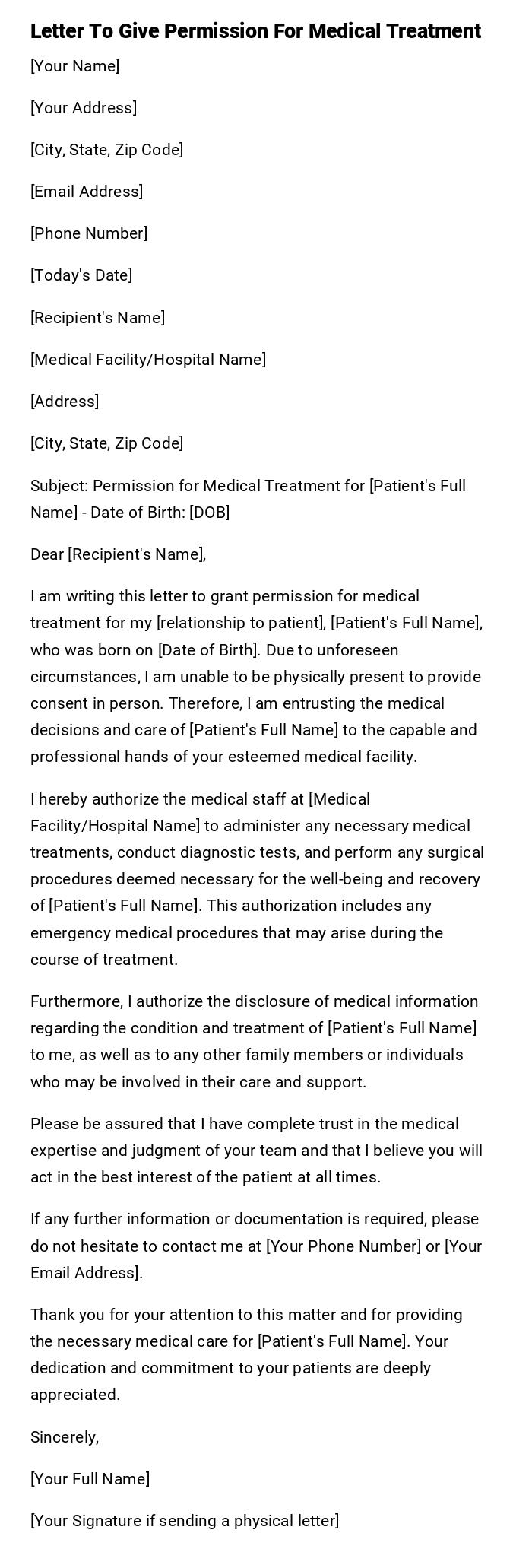
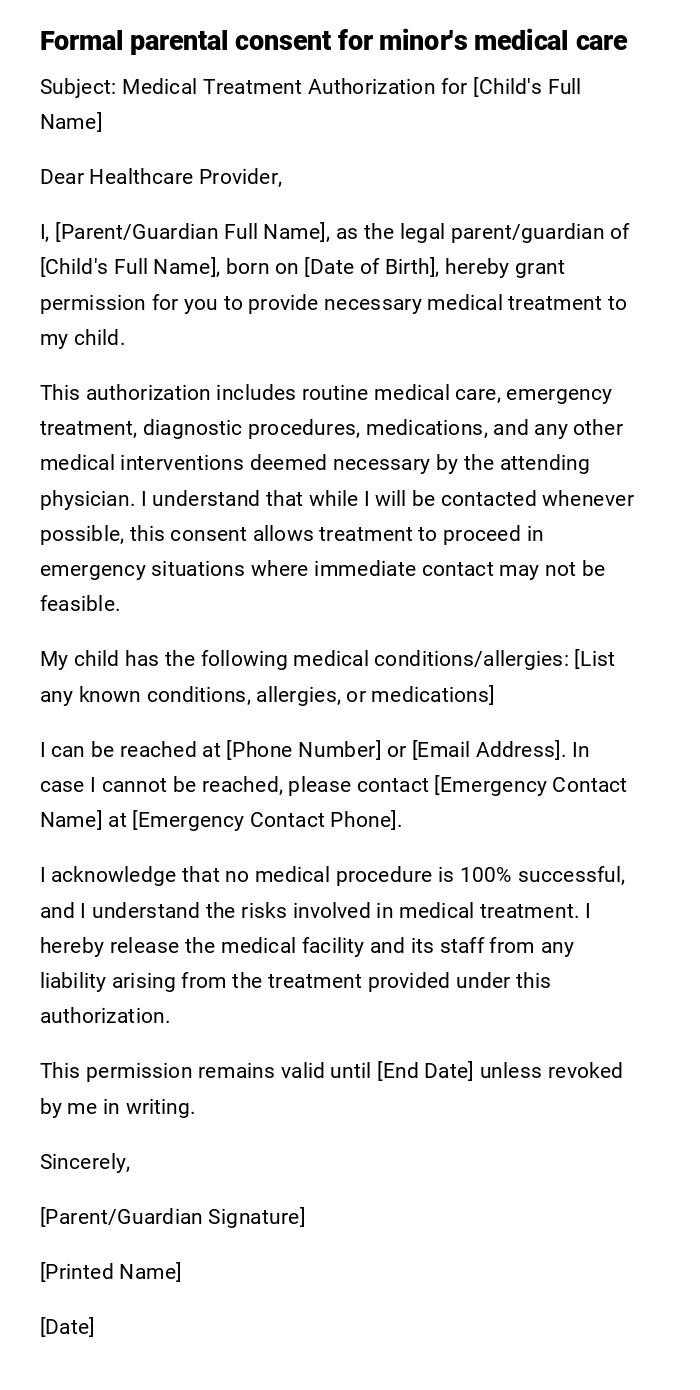
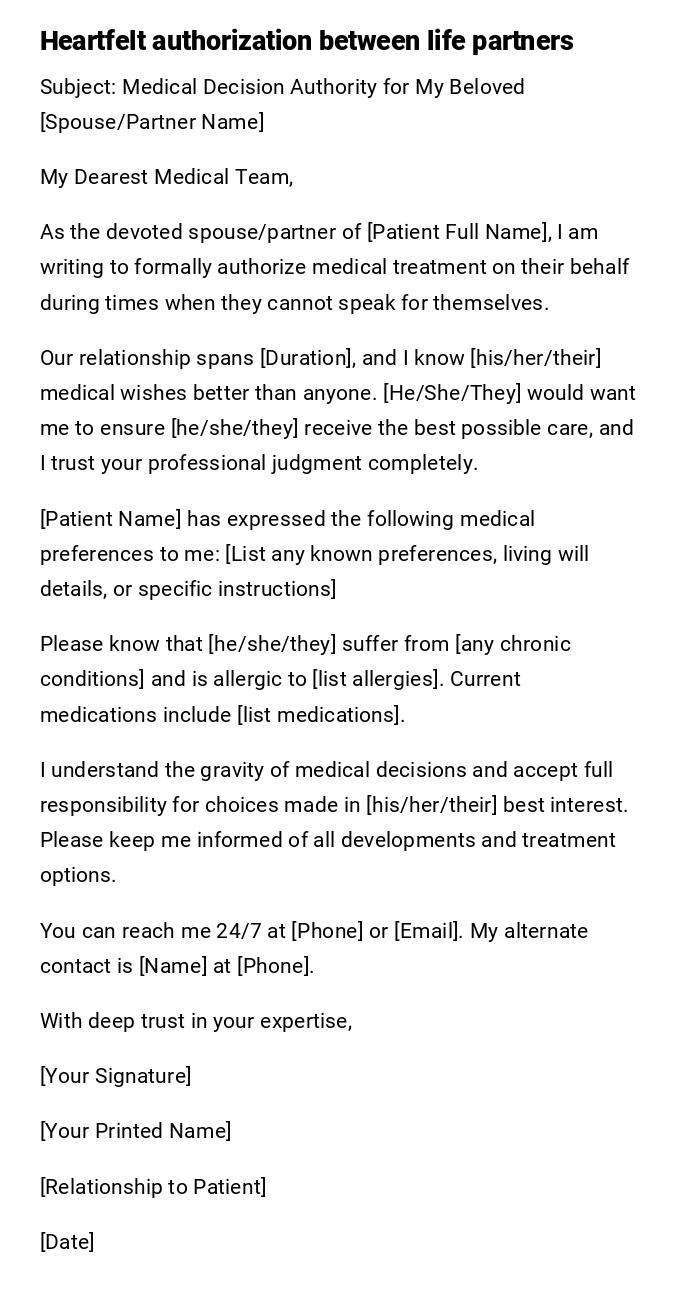
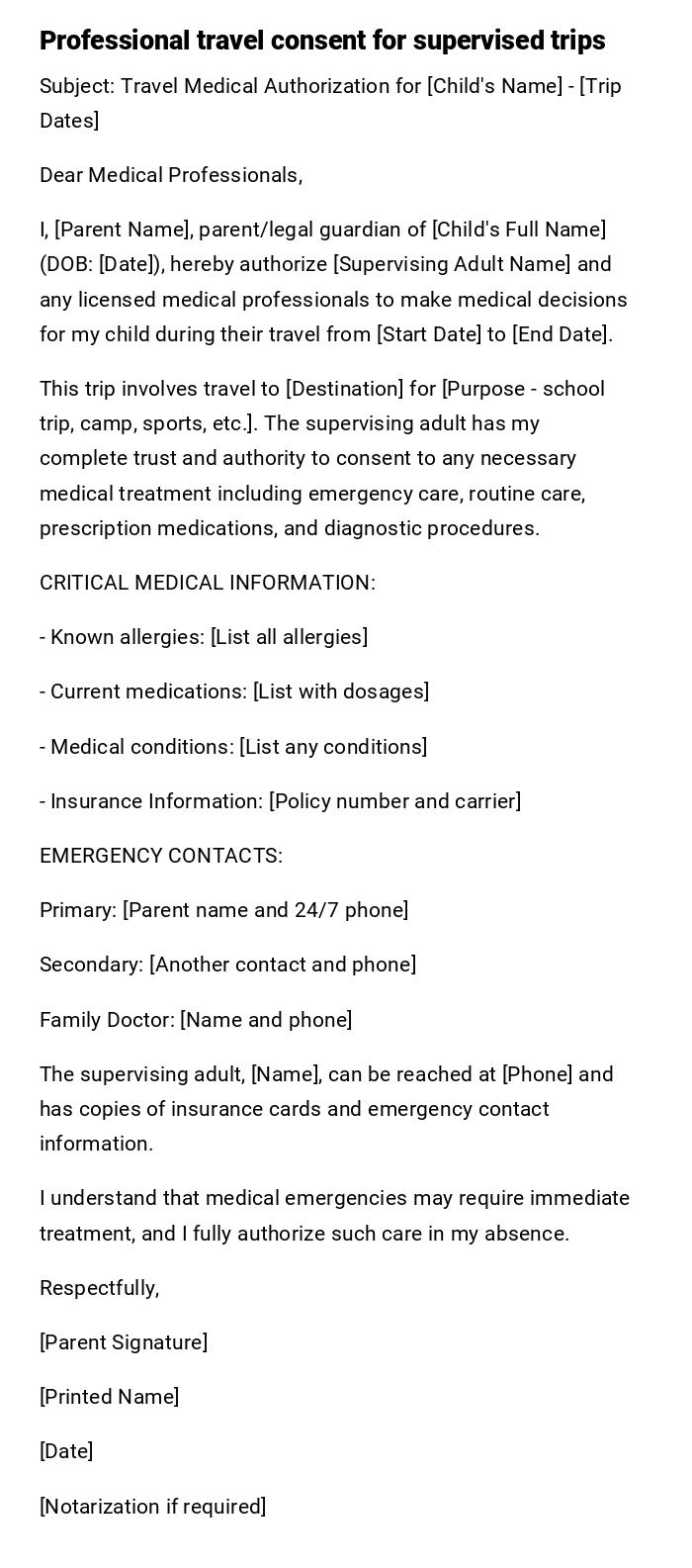
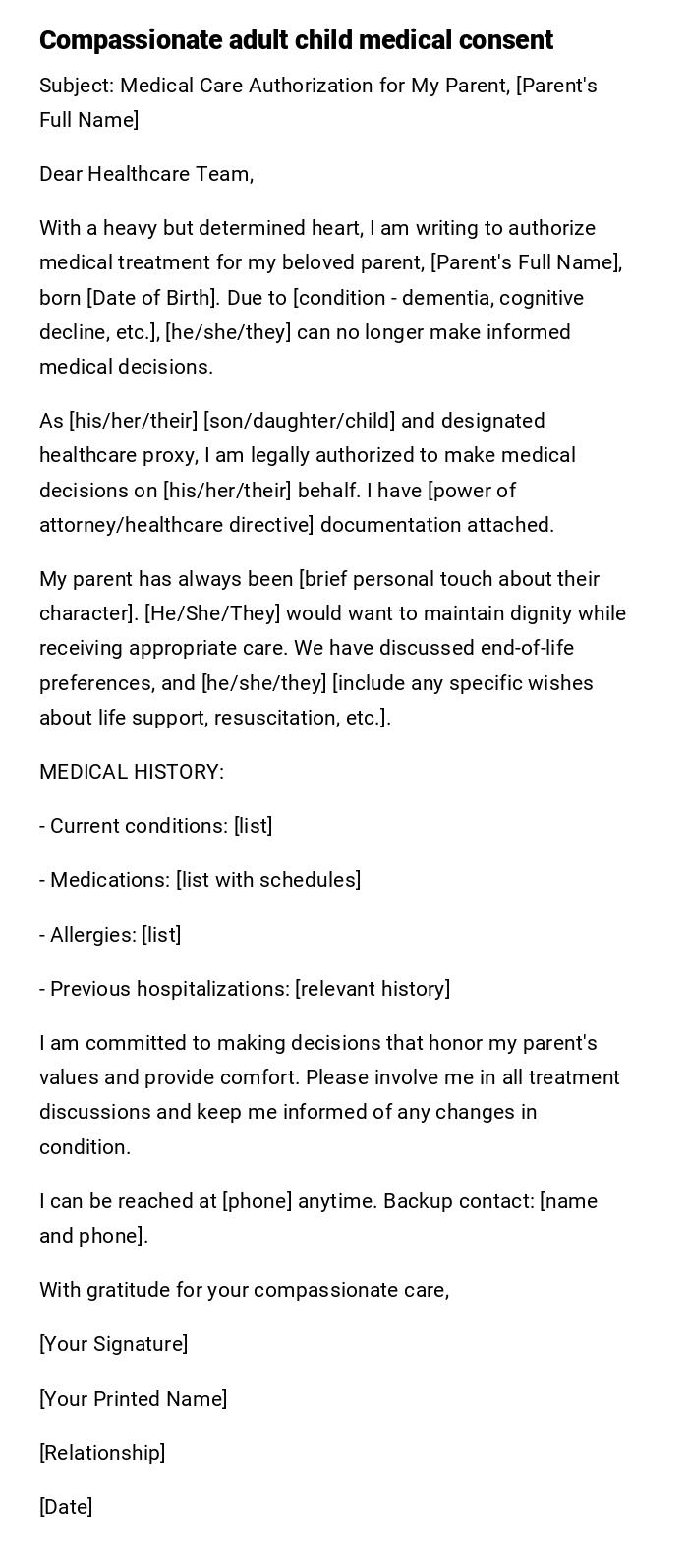
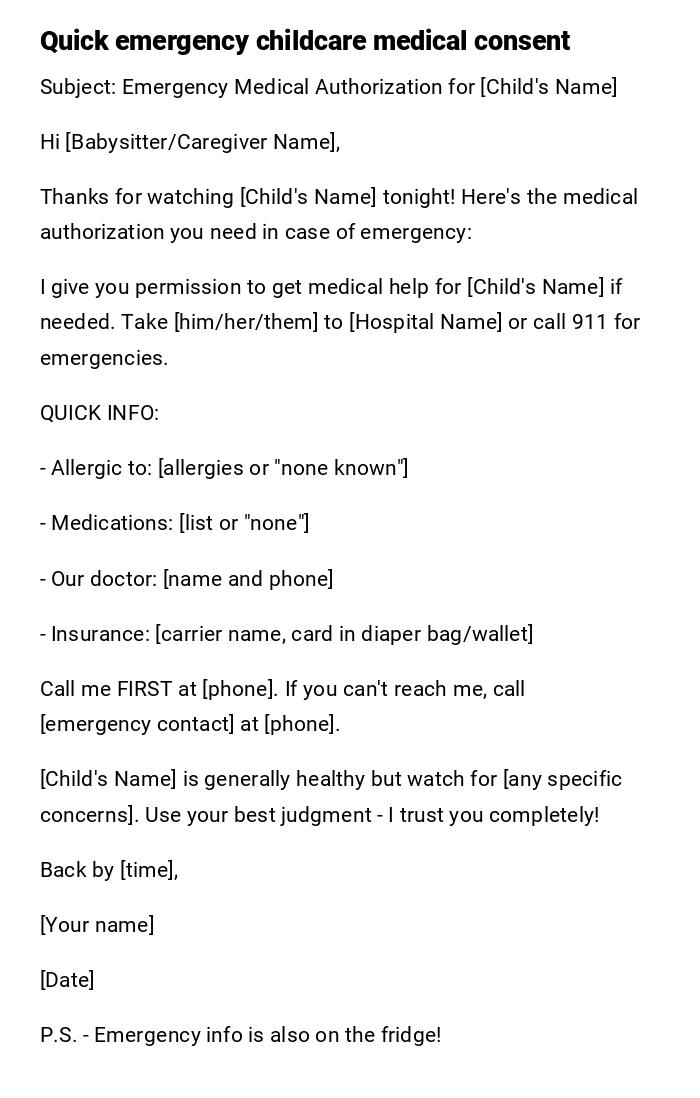
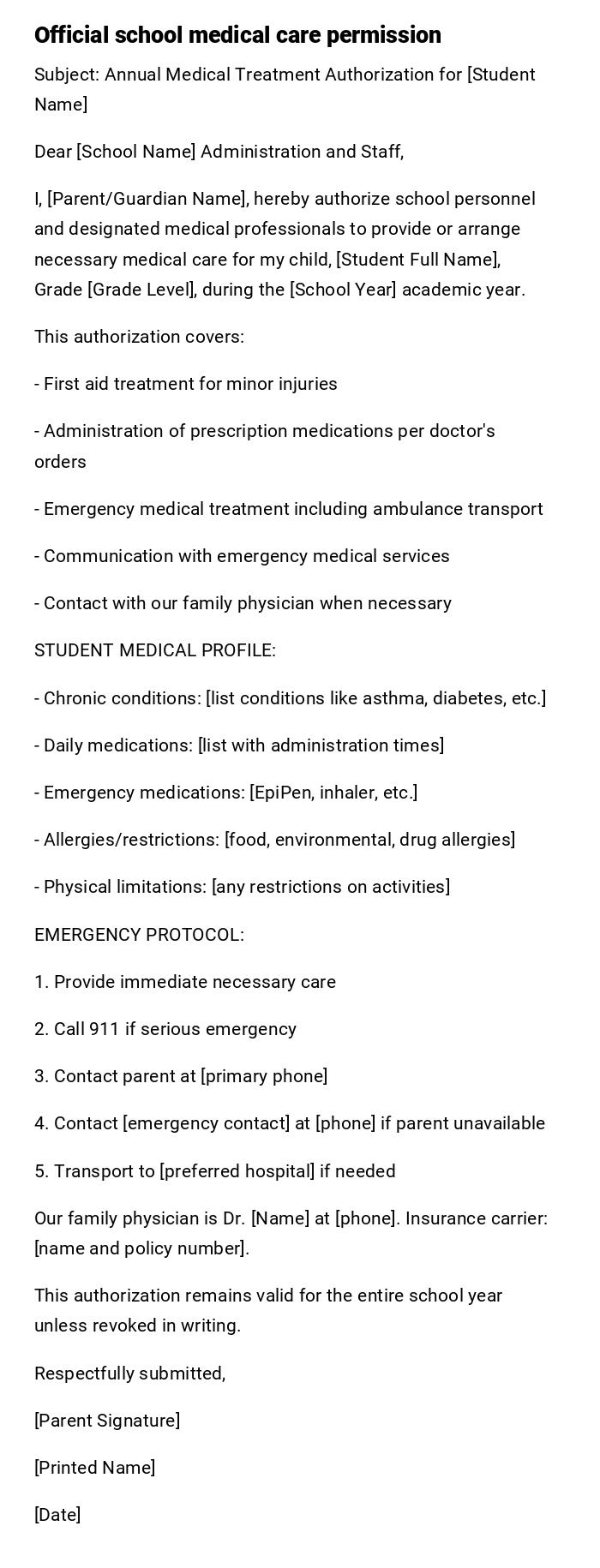
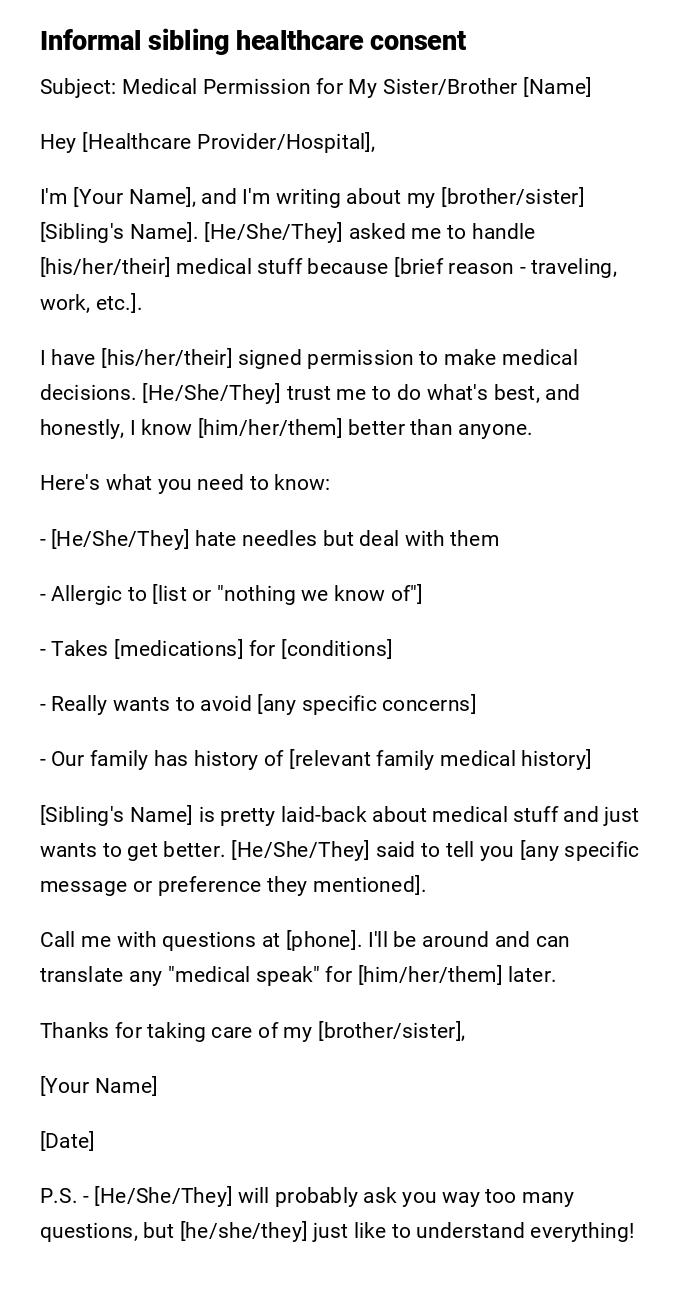
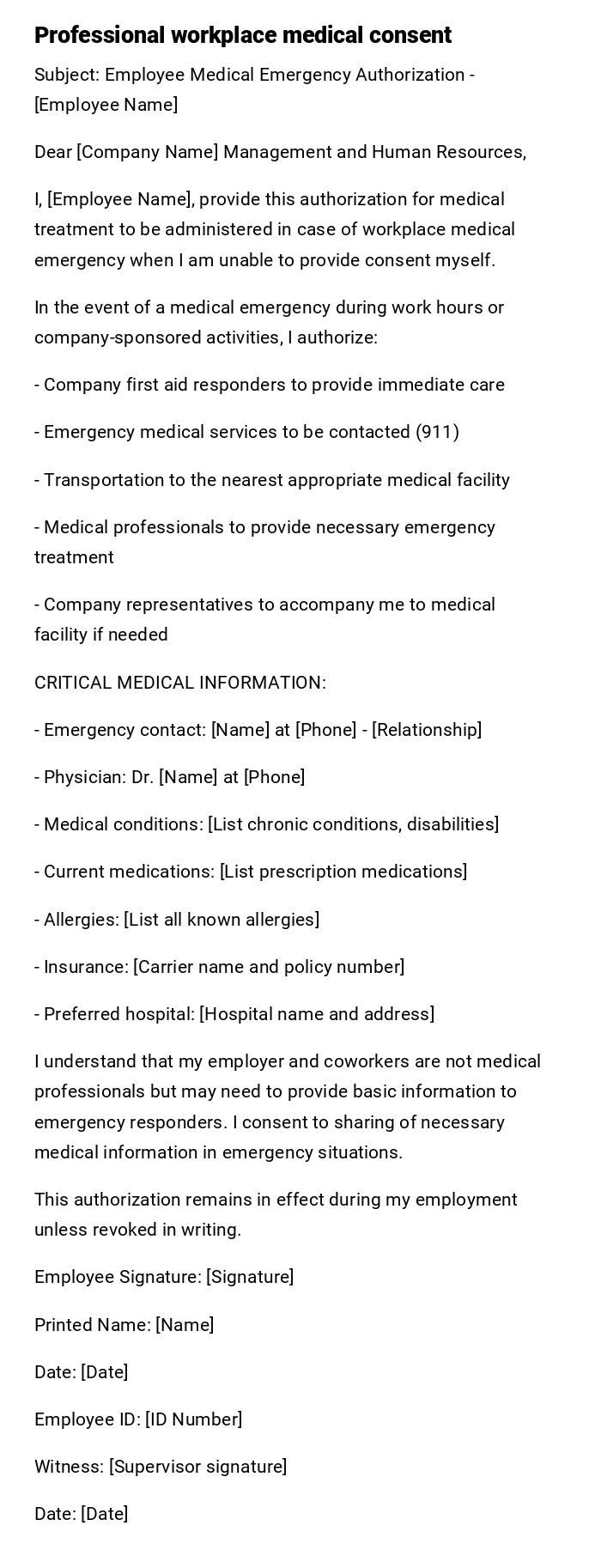

 Download Word Doc
Download Word Doc
 Download PDF
Download PDF